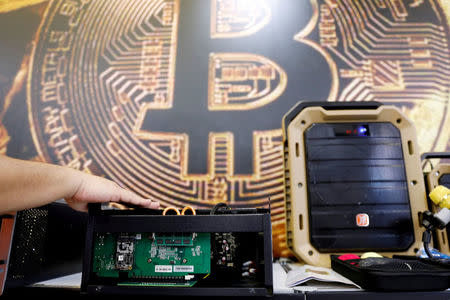U.S. agency's virtual currency oversight faces court challenge
By Nate Raymond
BOSTON (Reuters) - An obscure virtual currency called My Big Coin is now at the center of a closely watched case that could determine whether the U.S. Commodity Futures Trading Commission has the authority to combat fraud associated with cryptocurrencies.
Amid a crackdown on virtual currency scams, the U.S. regulator in January sued technology entrepreneur Randall Crater and a company he founded, alleging they perpetrated a $6 million fraud on people who wanted to buy My Big Coin.
Lawyers not involved in the lawsuit say that Crater's case raises a novel challenge to CFTC oversight of cryptocurrencies, which are not backed by any central bank.
His lawyers argue the CFTC has no authority over the virtual currency because it is not a commodity like wheat or cotton or a service that is traded using futures contracts, the typical focus of the agency's enforcement regime.
"Our argument boils down to the fact that because My Big Coin does not have future contracts or other derivatives trading on it, it is not a commodity," said Katherine Cooper, a lawyer for Crater.
Lawyers watching the case say a ruling against the CFTC could affect its ability to police virtual currency frauds as the only one on which futures contracts are traded in the United States is bitcoin, whose user base of millions dwarfs that of My Big Coin.
"It would have a chilling effect on the CFTC's application of its powers in this area," said Gregory Kaufman, a lawyer with the law firm Eversheds Sutherland.
U.S. District Judge Rya Zobel in Boston is set to hear arguments in the case on Thursday. The CFTC declined comment.
Bitcoin, the most popular virtual currency, and nearly 1,630 others exist have a market capitalization of $276.6 billion, according to cryptocurrency market data site Coinmarketcap.
Regulators have expressed concerns about fraud schemes targeting cryptocurrency users, but questions linger about who has jurisdiction over them.
The U.S. Securities and Exchange Commission has claimed authority over so-called initial coin offerings in which companies sell digital tokens to raise money. A federal judge in Brooklyn is now weighing whether cryptocurrencies can be considered securities.
To date, the CFTC has announced eight cryptocurrency-related cases.
In its lawsuit against Crater and Nevada-based My Big Coin Pay Inc, the CFTC says the defendants misappropriated $6 million from 28 customers they lured by naming their virtual currency to sound like bitcoin and further claiming it was backed by gold.
Lawyers for Crater contend, however, that My Big Coin is not a "commodity" under the Commodity Exchange Act because it is neither a tangible good nor a service on which future contracts are being traded.
The CFTC notes that in March, a federal judge in a different case, U.S. District Judge Jack Weinstein in Brooklyn, ruled for the first time that virtual currencies can be regulated by the agency as a commodity.
But Crater's attorneys counter that ruling involved bitcoin, for which futures are traded.
Neal Kumar, a lawyer at the law firm Willkie Farr & Gallagher, said Crater may still lose because the Commodity Exchange Act defines services as commodities not just when they currently have futures contracts associated with them but in the future could.
"The argument that falls flat for them is that there needs be current or existing futures contracts," he said. "And that's just not what statute says."
(Reporting by Nate Raymond in Boston; Editing by Anthony Lin and Steve Orlofsky)




